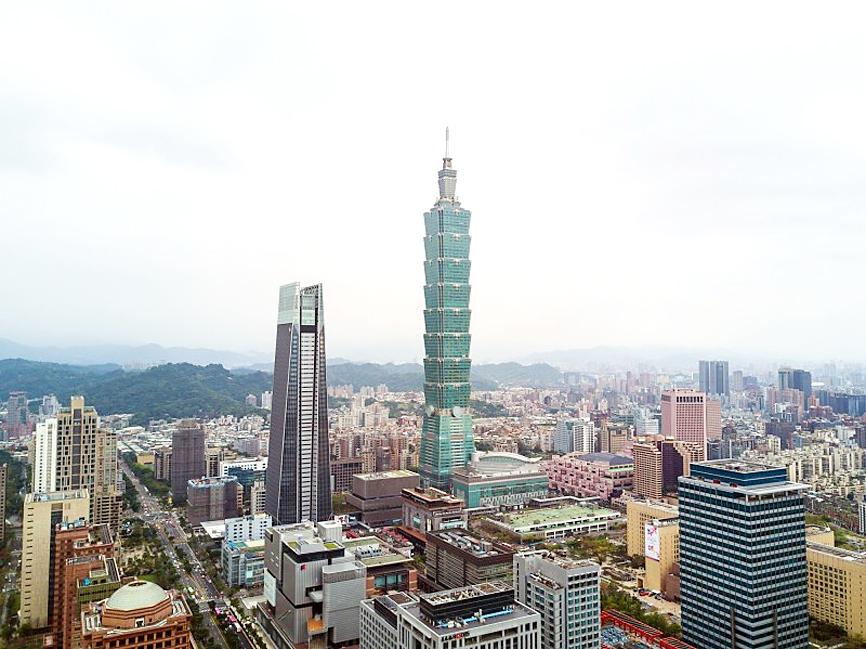The Chung-Hua Institution for Economic Research (CIER, 中華經濟研究院) yesterday cut its forecast for GDP growth this year to 2.01 percent from 2.72 percent it predicted in December last year, saying that global inflation, monetary tightening and geopolitical tensions would sap exports and leave it to private consumption to sustain the economy.
The downward revision was largely due to unfavorable external factors, such as the Ukraine war and inflation remaining above central bank targets in advanced economies, CIER president Yeh Chun-hsien (葉俊顯) said.
In addition, the US-China technology competition weighs on outbound shipments, as major Taiwanese electronics suppliers have large manufacturing facilities in China, Yeh said.

Photo: Taipei Times
Against that backdrop, exports, the main driver of GDP growth in Taiwan, are expected to contract 9.52 percent this year, while imports would shrink 9.49 percent, a stark contrast from last year’s solid gains of 7.41 percent and 12.06 percent respectively, the Taipei-based think tank said.
Taiwan Semiconductor Manufacturing Co (TSMC, 台積電), the world’s largest contract chipmaker, yesterday said that inventory adjustments would affect it more and longer than expected, adding that end-market demand would remain weak for smartphones and personal computers next quarter.
The guidance was more conservative than three months earlier, when the Hsinchu-based company said that effects of inventory adjustments would end in the first half of the year.
Yeh said GDP growth would likely remain above 2 percent, as exports are expected to regain traction in the fourth quarter, consistent with TSMC chief executive officer C.C. Wei’s (魏哲家) remark that the company’s inventory would return to healthy levels in the final quarter.
CIER predicted a GDP contraction of 0.89 percent for last quarter and mild recovery in the quarter ahead.
Private consumption would emerge further from a COVID-19 slump, expanding 4.64 percent this year and contributing 2.08 percentage points to GDP growth, it said.
Consumer prices would increase 2.18 percent, higher than the central bank’s 2 percent target, driven by more expensive food, services and rents, it said.
Academia Sinica research fellow Ray Chou (周雨田) said Taiwan’s consumer price increases have been above the target for 21 straight months, indicating that inflationary pressures are not transient in nature.
The government might raise electricity prices a second time this year to keep unprofitable state-run Taiwan Power Co (台電) afloat, after an 11 percent increase this month, Chou said.
The jobless rate is to remain steady at 3.62 percent, while the New Taiwan dollar would trade at an average of NT$30.45 against the US dollar, CIER said.

Intel Corp chief executive officer Lip-Bu Tan (陳立武) is expected to meet with Taiwanese suppliers next month in conjunction with the opening of the Computex Taipei trade show, supply chain sources said on Monday. The visit, the first for Tan to Taiwan since assuming his new post last month, would be aimed at enhancing Intel’s ties with suppliers in Taiwan as he attempts to help turn around the struggling US chipmaker, the sources said. Tan is to hold a banquet to celebrate Intel’s 40-year presence in Taiwan before Computex opens on May 20 and invite dozens of Taiwanese suppliers to exchange views

Application-specific integrated circuit designer Faraday Technology Corp (智原) yesterday said that although revenue this quarter would decline 30 percent from last quarter, it retained its full-year forecast of revenue growth of 100 percent. The company attributed the quarterly drop to a slowdown in customers’ production of chips using Faraday’s advanced packaging technology. The company is still confident about its revenue growth this year, given its strong “design-win” — or the projects it won to help customers design their chips, Faraday president Steve Wang (王國雍) told an online earnings conference. “The design-win this year is better than we expected. We believe we will win

Chizuko Kimura has become the first female sushi chef in the world to win a Michelin star, fulfilling a promise she made to her dying husband to continue his legacy. The 54-year-old Japanese chef regained the Michelin star her late husband, Shunei Kimura, won three years ago for their Sushi Shunei restaurant in Paris. For Shunei Kimura, the star was a dream come true. However, the joy was short-lived. He died from cancer just three months later in June 2022. He was 65. The following year, the restaurant in the heart of Montmartre lost its star rating. Chizuko Kimura insisted that the new star is still down

While China’s leaders use their economic and political might to fight US President Donald Trump’s trade war “to the end,” its army of social media soldiers are embarking on a more humorous campaign online. Trump’s tariff blitz has seen Washington and Beijing impose eye-watering duties on imports from the other, fanning a standoff between the economic superpowers that has sparked global recession fears and sent markets into a tailspin. Trump says his policy is a response to years of being “ripped off” by other countries and aims to bring manufacturing to the US, forcing companies to employ US workers. However, China’s online warriors